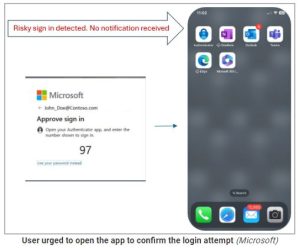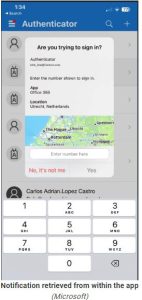Microsoft has added a new security feature to the Authenticator app. This feature blocks suspicious notifications that occur during the account login process.
Microsoft Authenticator is an app that provides multi-factor authentication, password auto-fill, and password-less sign-in to Microsoft accounts.
By infosecbulletin
/ Wednesday , June 18 2025
Russian cybersecurity experts discovered the first local data theft attacks using a modified version of legitimate near field communication (NFC)...
Read More
By infosecbulletin
/ Tuesday , June 17 2025
Cybersecurity researcher Jeremiah Fowler discovered an unsecured database with 170,360 records belonging to a real estate company. It contained personal...
Read More
By infosecbulletin
/ Tuesday , June 17 2025
GreyNoise found attempts to exploit CVE-2023-28771, a vulnerability in Zyxel's IKE affecting UDP port 500. The attack centers around CVE-2023-28771,...
Read More
By infosecbulletin
/ Tuesday , June 17 2025
The U.S. Cybersecurity and Infrastructure Security Agency (CISA) has recently included two high-risk vulnerabilities in its Known Exploited Vulnerabilities (KEV)...
Read More
By infosecbulletin
/ Monday , June 16 2025
SafetyDetectives’ Cybersecurity Team discovered a public post on a clear web forum in which a threat actor claimed to have...
Read More
By infosecbulletin
/ Sunday , June 15 2025
WestJet, Canada's second-largest airline, is looking into a cyberattack that has affected some internal systems during its response to the...
Read More
By infosecbulletin
/ Saturday , June 14 2025
Resecurity found 7.4 million records of Paraguayan citizens' personal information leaked on the dark web today. Last week, cybercriminals attempted...
Read More
By infosecbulletin
/ Friday , June 13 2025
HashiCorp has revealed a critical vulnerability in its Nomad tool that may let attackers gain higher privileges by misusing the...
Read More
By infosecbulletin
/ Friday , June 13 2025
SoftBank has disclosed that personal information of more than 137,000 mobile subscribers—covering names, addresses, and phone numbers—might have been leaked...
Read More
By infosecbulletin
/ Friday , June 13 2025
Serious security vulnerabilities in Trend Micro Apex One could allow attackers to inject malicious code and elevate their privileges within...
Read More
When a user tries to log into an account with protected by multi-factor authentication (MFA), the Authenticator app sends a push notification to the user’s device to grant or deny access.
Alternatively, the app generates a temporary access code for users to manually log into their account.
ALSO READ:
Trial run of ‘Smart Parking’ app started at Dhaka
Hackers exploit push notifications by performing many login attempts on the target account, often at inconvenient times, to frustrate or tire the recipients.
If the tired user agrees to a request, the attacker can enter the account and change the login security settings to lock out the real user.
Microsoft added a security feature called “number matching” in May. It requires users to enter a number from the sign-in screen into their Authenticator app to approve the login.
Although this measure has reduced the effectiveness of MFA fatigue attacks, it doesn’t stop the generation of the annoying notifications themselves.

Microsoft has added new features to fight against malicious activity. These features examine login attempts for unfamiliar locations or signs of unusual activity, and block the related notifications.
Instead, users receive a message that prompts to open the Authenticator app and enter a given code.
You can still see login notifications in the Authenticator App for review when needed.

Microsoft has blocked over six million MFA notifications believed to be from hackers since the new feature was rolled out in September.


 InfoSecBulletin Cybersecurity for mankind
InfoSecBulletin Cybersecurity for mankind














